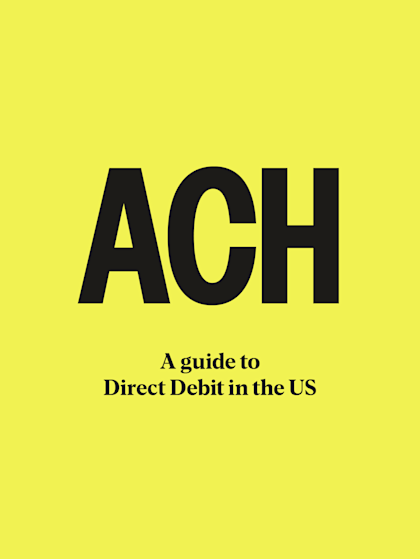
Credit Card vs. Direct Debit
Last editedApr 20231 min read
Recurring credit card payments and Direct Debit (also known as ACH Debit or bank debit) both enable you to take and manage payments easily. But there are some important differences. This guide gives a comparison to help you decide which is best for you.
Direct Debit - also known as ACH Debit or bank debit - and recurring card payments are two of the most common methods used for taking regular payments.
Both enable you to take and manage payments from thousands of customers easily, but you should be aware of some important differences.
Card payments and Direct Debit are both automatic
Both recurring card payments and Direct Debit payments can vary in amount and frequency.
How to collect Direct Debit payments with GoCardless
1.
Create your free GoCardless account, access your user-friendly payments dashboard & connect your accounting software (if you use one).
2.
Easily set up & schedule Direct Debit payments via payment pages on your website checkout or secure payment links.
3.
From now on you'll get paid on time, every time, as GoCardless automatically collects payment on the scheduled Direct Debit collection date. Simple.
Card payments are taken via card networks, whereas Direct Debits are made directly between bank accounts
Card payments are taken by credit or debit card. Customers must supply you with their 16 digit card number, which is then linked to your bank account by the card networks and settlement banks.
Direct Debit payments are taken directly from your customer’s bank account. Customers sign up to the Direct Debit using their bank account number and routing number.
Card payments vs. Direct Debit - A comparison
Here’s a comparison of the two payment methods for you:
| Card payments | Direct Debit | |
|---|---|---|
| Set up | Customers sign up using their credit or debit card number by phone, online, or in-person. | Customers complete a Direct Debit mandate form online, by paper, or over the phone using their bank account number and routing number. |
| Cost per payment | High. Typically around 2-3% + $0.15-0.30 per payment (plus any other associated fees, such as a monthly fee for a merchant account). fee for a merchant account. | Low. Depends on your provider. (See our pricing) |
| Failure rates | High. c. 5% due to credit card expiry and cancellation. | Very low. < 1% with GoCardless. This is much better for customer retention. |
| Flexibility of payments | High. You can collect variable amounts or change the amount or date of payments without asking customers for further authorization. | High. You can collect variable amounts or change the amount or date of payments without asking customers for further authorization. |
| Risk of late payment | Low. You can charge customers when payment is due. | Low. You can charge customers when payment is due. |
| Admin required | Mid. You will need to chase customers to update their details when cards expire or are cancelled. Expect this to happen at least every 3 years per customer. | Low. Uses bank details which rarely expire or are cancelled, so churn is much lower. |
| Customer protection | High. Chargebacks are possible with credit cards. | HighRefunds from your bank in the event of an incorrect charge (contingent on ACH customer protection rules). |
Should I use card payments or Direct Debit?
Card payments and Direct Debit can both be used for recurring payments, including those which vary in amount and frequency.
Card payments offer many similar benefits to Direct Debit but suffer from higher failure rates due to card expiry and cancellation. This is a bad experience for your customers. It creates unnecessary work for them having to update their details, and they may even decide to let their payments lapse to avoid the hassle. By contrast, Direct Debit payments use a customer’s bank details, which rarely expire or change.
Therefore, card payments should only be used for regular payments instead of Direct Debit if you require next-day payments. For example, if you are delivering physical goods online. Otherwise, due to lower failure rates and lower costs, Direct Debit should be used.
To find out more about using Direct Debit to collect payments, check out our 60 second Guide to accessing the Direct Debit scheme.

